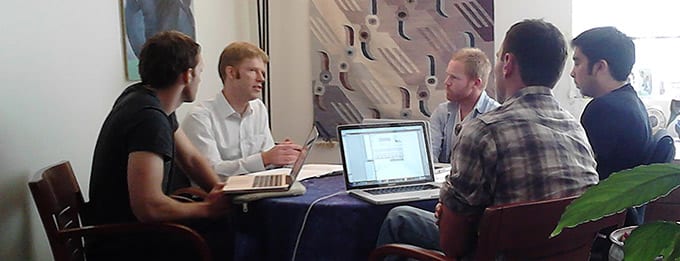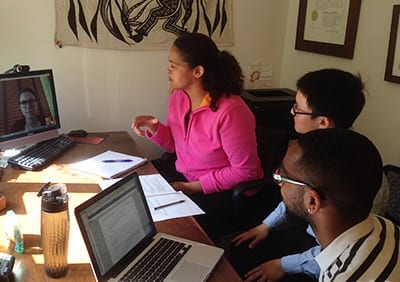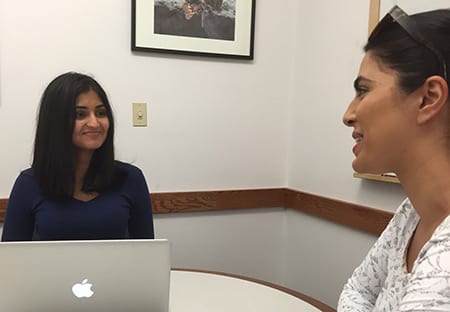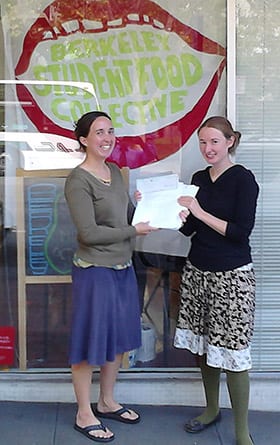
By Kirsten Mickelwait
Successful startups appear in the news almost daily, depicting the Bay Area as a kind of Shangri-La for entrepreneurs. In truth, what attracts attention are the few finishers in a long, grueling race for new businesses trying to survive. The reality is that most early-stage businesses don’t even make it out of the gate—after five years, only about half survive.
Berkeley Law’s New Business Practicum is trying to change that equation. Since 2007, the practicum has been the law school’s engine of startup development in the Bay Area, bringing together two groups: entrepreneurs who need early-stage legal advice that they can’t afford, and students who need opportunities to practice.

Law and Haas Business School students work in teams to assist entrepreneurs with the many legal challenges involved in launching a business, including managing risks and establishing key relationships with workers, investors, and consumers. Since its beginning, over 200 startups have received individual help and another 200 have benefitted from training sessions offered at community incubators.
The idea, which grew out of a course by practicum Director Bill Kell, has developed into a kind of successful startup itself, showing how a simple business law class can become both experiential and impactful in the local community. Kell mentors students to be the “can-do” creative counselors that entrepreneurs need.
“After five weeks of intense training, our students begin to act like the business-savvy practitioners they aspire to become,” said Kell, who serves as the students’ supervising attorney. “They show their value right away by asking the questions that startups need to address: What is the business model? What are the risks involved? What kinds of legal relationships do the founders need to put into place in order to hire workers and secure capital?”
The eight-year old program is one of the key components of Startup@BerkeleyLaw, a new initiative designed to train the next generation of startup attorneys, which was recently launched by the school’s Berkeley Center for Law and Business (BCLB) and Berkeley Center for Law & Technology (BCLT). In addition to the practicum, these include the InSITE Fellowship, which teams law and Haas business students on consulting projects for local startups; and the Berkeley IP Lab, an experiential course that pairs law students with Berkeley-affiliated startups. “The synergy among these programs is creating a vibrant startup space for students interested in transactional law,” Kell said.
Bootstraps get a leg up
CLIQUED.TV and Care for Peace are two practicum-supported startups that recently began their second year on solid legal footing and are now poised to expand. CLIQUED.TV is a wireless platform for bars and restaurants that lets patrons post live content on television. Co-founder and CEO Geoff Hoehn joined Haas alumnus Austin Lee ’14 to grow the company at the UC Berkeley accelerator SkyDeck. Practicum students helped the pair negotiate everything from initial formation, risk management, and regulatory hurdles to customer relationships and corporate restructuring. Without their assistance, Hoehn said, “It’s hard to imagine how we would have been able to move forward.”
Care for Peace, a non-profit led by doctors and hospital administrators, has taken on the daunting task of assisting the Myanmar government in bringing a medieval-level health care system into the 21st century. The organization has already opened the first of many “mini-medical centers” designed to bring modern health care to rural communities. Founder Jeff Hardy estimates that he has received more than $250,000 worth of expert international legal advice through the practicum. “Bill Kell and his amazing students helped us complete an extremely complicated process,” Hardy said. “Without them, I think I’d still be struggling to figure out the 501(c)(3) forms.”

These are common experiences shared by leading startups cooked at Berkeley Law, such as Magoosh, the popular GRE and GMAT prep site; Rixty, the innovative online gaming-payment site for youth; and Indiegogo, the nation’s leading crowdfunding platform. The practicum is also distinguished by having both urban and rural initiatives: beginning this term, it will pilot a startup assistance program in California’s Central Valley where the number of new businesses has slowed to a trickle.
Holistic advice
Unique among most law school clinics, the practicum has fostered important synergies between law and business students, who together can provide the kind of holistic advice that entrepreneurs need, particularly at the early “idea” stage. Jaspreet Mann ’16, in her second semester with the program, holds regular office hours at the Lester Center for Entrepreneurship at Haas and SkyDeck.
“The practicum has given me the confidence to talk directly to clients, knowing how to prepare to be as useful and efficient as possible,” she said. “It’s trained me to look at issues not just from the legal perspective, but from a business angle.”
Just a few weeks into the new term, Mann has already helped set up two critical founding-group relationships. She’s also continuing the practicum’s assistance to CLIQUED.TV and coordinating the program’s new “Berkeley Startup Corp”—where practicum-trained students volunteer to provide free legal workshops for local entrepreneurs. Like many of her classmates, Mann plans to pursue a business law career; after graduation, she will join an international law firm in San Francisco that serves emerging businesses.
Secret sauce

A key resource for the practicum is its team of 40 “pay-it-forward” alumni, including law graduates like Bryan Springmeyer ’10. Since founding Springmeyer Law in 2010, he has worked primarily with tech startups and angel investors—including Google’s acquisition of Holomni, a small design firm. Even with a bustling transactional practice, Springmeyer returns regularly to teach classes on capitalization, and more.
“Having that hands-on element with the clients was a hugely valuable take-away for me as a student,” he said. “In developing my own practice, I still think back on things I learned through the practicum.” Springmeyer regularly shares his experience with students like Mann, teaching them how to launch their own successful law practice.
As a successful startup educational experiment, the practicum has its own “secret sauce,” Kell said, “something entrepreneurs normally want to keep under wraps. The program unites visionary entrepreneurs, who need safe passage through a difficult legal landscape, with students eager to practice what they’ve learned in the classroom. Such students are further advised by loyal alums, who generously circle back to guide and inspire them,” he said. “Each stakeholder—entrepreneurs, students, and alumni—is able to pursue his or her own development, while furthering the dreams of the others.”
Kell invited other Berkeley Law alums to join in the venture to mentor the next generation of business-savvy practitioners.